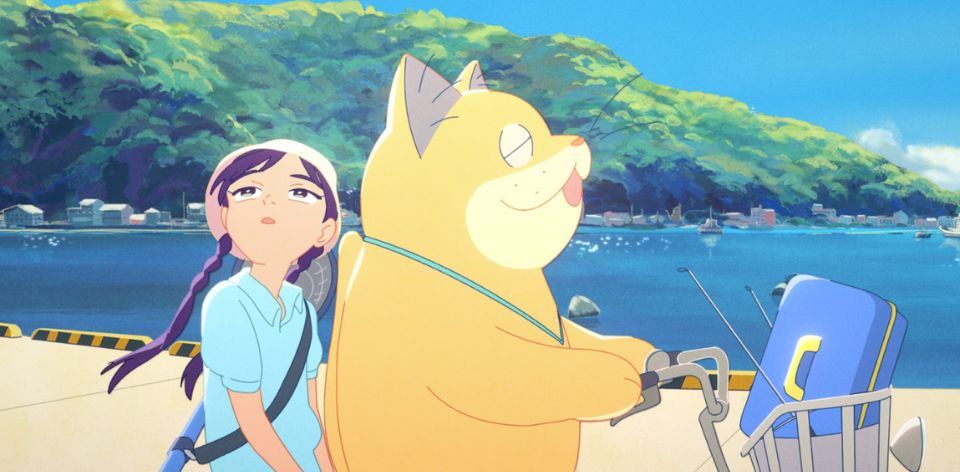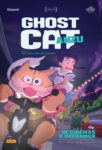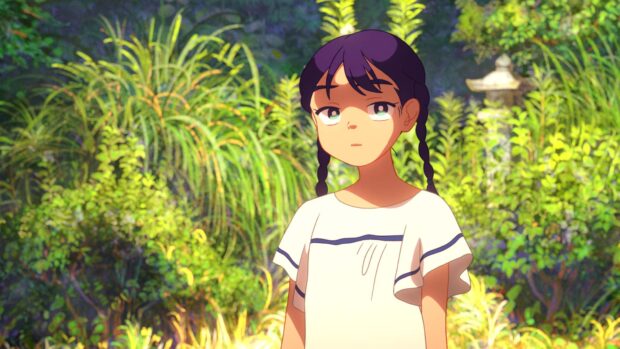If mainstream Japanese animation is anything to go by, every school-aged child seems destined to experience their seminal coming-of-age moments through a magical being during an extended summer stay with relatives. This is familiar ground for directors Nobuhiro Yamashita and Yoko Kuno, who revisit themes explored in their 2020 collaborative short film, Lucky Owl with Shimako.
Based on Takashi Imashiro’s serialised manga, the film is set in the coastal inlet of Iketeru, winkingly dubbed the “town of eternal summer.” Eleven-year-old Karin (voiced by Noa Gotō) arrives there with her father, Tetsuya (Munetaka Aoki), at Sousei-Ji temple, home to her grandfather (Keiichi Suzuki). When Tetsuya is kicked out after asking for money to pay off a loan shark, he leaves Karin behind, promising to return on the anniversary of her mother’s death.
Soon after, Karin encounters Anzu (Mirai Moriyama), the titular ghost cat: an anthropomorphic feline riding a scooter, larger than an adult human, and perpetually wearing a flip phone around his neck. Befriending two local boys and a host of animal gods, Karin and Anzu embark on a series of minor adventures that span both this world and the hereafter.
The web is already brimming with comparisons between this film and Spirited Away—and if you’ve read this far, you’ll see I’ve now contributed to that discourse. The back half certainly invites the comparison, with Karin and Anzu embarking on a strange journey through the Kingdom of the Dead. Yet the rest of the film is a bizarre, jarring mix of tones and styles, swinging from crude comedy to philosophical ponderings, often making it unclear who the intended audience might be.
Take, for instance, a subplot involving the God of Poverty. Depicted as a grubby, toothless man in a loincloth, his attempts to fulfil his ‘job’ are frequently foiled by Anzu but just as often elicit unsettling suggestions of self-harm from his targets. Similarly, Anzu oscillates between threatening violent murder with a makeshift spear and farting on his friends for laughs. This randomness dominates much of the runtime, with side characters rarely contributing meaningfully until the chaotic final act.
This tonal inconsistency is mirrored in the animation. The backgrounds are often stunning, with lush, detailed depictions of summer landscapes. By contrast, the characters range from realistically drawn figures like Karin and Tetsuya to exaggerated caricatures or minimalist, rounded designs. This embrace of both grotesquerie and comedy is characteristic of Shin-Ei Animation (collaborating here with France’s Miyu Productions), the studio behind recent film versions of Shin Chan and Doraemon.
Where GHOST CAT ANZU shines brightest is in its unrestrained, rollercoaster finale. As hell quite literally breaks loose, a modest commentary on grief is consumed by a wild chase across Tokyo in a minibus full of demons. It’s as illogical as anything else in the film—a delightfully anarchic adventure perfectly tailored to kids navigating their own existential crises.
2024 | Japan | DIRECTOR: Yōko Kuno, Nobuhiro Yamashita | WRITERS: Shinji Imaoka (Based on a manga by Takashi Imashiro) | CAST (Japanese): Mirai Moriyama, Noa Gotō, Munetaka Aoki, Miwako Ichikawa, Keiichi Suzuki, Shingo Mizusawa, Wataru Sawabe | CAST (English): Jason Simon, Evie Hsu, Andrew Kishino, Erica Schroeder, David Goldstein, Jon Allen | DISTRIBUTOR: Toho Next (Japan), Kismet (Australia) | RUNNING TIME: 94 minutes | RELEASE DATE: 3 December 2024 (Australia)






